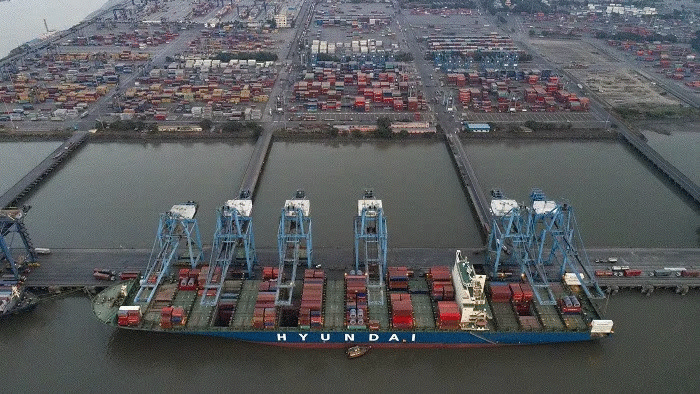Maharashtra
Navi Mumbai: Jawaharlal Nehru Port Authority Appoints IDBI Capital As Transaction Advisor To Raise Funds For Controversial Vadhavan Project

The Jawaharlal Nehru Port Authority (JNPA) has appointed IDBI Capital Markets and Securities Ltd as the transaction advisor to raise funds for the ambitious Vadhavan Port. The Port authorities and IDBI Capital has also held preliminary discussions with potential funding agencies to raise funds for the mega project.
“While the initial funding will come from the equity contributions of the Port promoters, the debt will be raised in a phased manner subject to finalisation of project structuring and timeline of revenue generation on the back of award of concessions to private firms for running cargo terminals,” a senior JNPA official said not wishing to be named.
Port awaits environmental and coastal clearance
JNPA will develop Vadhavan Port in Dahanu taluka of Palghar district with the participation of the Maharashtra government and Maharashtra Maritime Board (MMB). A memorandum of understanding (MoU) was signed on June 5, 2015 to set up a new port at Vadhavan as a major port to be notified under the Indian Ports Act, 1908 by the Government of India. This port will be jointly implemented by JNPA and MMB with a shareholding of 74 per cent and 26 per cent respectively. The port will be developed on the Landlord Port concept.
The proposed Port is currently awaiting environmental and coastal clearance from the Ministry of Environment, Forests & Climate Change (MoEF&CC). A committee of the Pollution Control Board recently held a public hearing to address environmental concerns for the Greenfield port. The hearing was held in the presence of Deputy Collector of Daman, Dadara & Nagar Haveli, which was attended by the various stakeholders and representatives of fisherman community.JNPA identified sand borrow pit at around 50 km to 60 km in the Arabian Sea from the proposed Vadhavan Port and about 50 km from Daman Coast for obtaining 200 Million CuM sand by dredging to create land at the proposed Vadhavan Port. In the public hearing held as per the directions of the MoEF&CC, various concerns raised by the stakeholders were addressed and the hearing went smoothly. The minutes of the public hearing would be forwarded to MoEF&CC to obtain comprehensive Environment Clearance for the development of Vadhavan Port.
Environmentalists oppose the port
The Rs 76,220 Crore Greenfield Port at Vadhavan in Dahanu Taluka of Palghar district has been opposed by the environmentalists claiming the port is an ecological disaster in waiting.JNPA had signed a memorandum of understanding (MoU) worth ₹20,000 crore with global logistics operator DP World at the Global Maritime India Summit in Mumbai, for the development of the Vadhavan port. JNPA said the Vadhavan port is JNPA’s one of the most ambitious projects that will be able to handle almost 24 million TEUs, making it among the top 10 in the world.
Maharashtra
Mumbai: Sadanand date is certain to be the next DGP of Maharashtra, the state government will decide soon, the NIA chief can now be appointed as the state chief

Mumbai: Sadanand Date is certain to be appointed as the new Maharashtra chief. Sadanand Date is currently serving as the head of the National Intelligence Agency (NIA). The state government has recommended Maharashtra cadre IPS Date for the post of DGP, after which Sadanand Date can now be appointed as the new DGP of Maharashtra. Date is also an important contender because his retirement is in 2027 and he will remain in the post of DGP for two years. The state government will soon take a decision regarding the DGP. The government has also requested to send Sadanand Date back to the state cadre, which makes it clear that Sadanand Date can be selected as the next DGP. Many senior officers are in the race for this post, but Data is the most senior among the senior officers.
Maharashtra
Illegal Bangladeshi birth certificate… Dr. Ashraf Qazi accused of forging certificate, kirit Somaiya demands action in L Ward

Mumbai: Police has started an operation against Bangladeshis in Mumbai. On the other hand, BJP leader Kirit Somaiya has started demanding action against Bangladeshis. In Kurla, an alleged Bangladeshi girl, Najma, gave birth to a girl in 2024. Najma had sent an application to the Kurla L Ward and the Collector, including the education officer, for issuing her birth certificate. In this, Kirit Somaiya has made a serious allegation that Najma is Bangladeshi and Dr. Ashraf Qazi of the clinic in the building adjacent to Kurla LIG Colony had given her a certificate for the birth certificate of her girl, after which the certificate of this Bangladeshi girl, Saiba, was issued. Kirit Somaiya has also released the Aadhar card of Najma and her husband Ayub Nat on X in this regard. Along with this, the doctor’s certificate obtained from RTI has also been released by Kirit Somaiya on X, in which the doctor said that the girl was born on November 19, but the birth took place at home. The BHMS doctor had confirmed all this. Based on the documents, Kreet Soumya has demanded action against Bangladeshi Najma. Along with this, in the application that Najma has filed before the Tahsildar, she has requested to obtain the birth certificate as soon as possible and the signature she has at the end is in Bengali. Kreet Soumya met the health officer in L ward and demanded action against the Bangladeshi birth certificate. Once again, Kreet Soumya has started targeting Muslim-majority areas before the BMC elections. Earlier, Kreet Soumya had targeted Govindi, Mankhurd and Malegaon in the case of fake certificates. Now, Kreet Soumya has applied in the suburban area of Kurla, Mumbai, that birth certificates of Bangladeshis have been issued here too. Kreet Soumya has also referred to 15 fake certificates that have been issued to alleged Bangladeshis in Kurla. Mumbai Police has deported more than 1,000 Bangladeshis living in Mumbai and registered 404 cases, despite which Kret Soumya is not satisfied with the police’s action. This action was reported by Mumbai Police Commissioner Devin Bharti himself. When Dr. Ashraf Qazi was asked about Kret Soumya’s allegation, he called it baseless and said that the girl was born at home and after that the girl had a complaint, I treated her and issued her medical certificate. The work of issuing birth certificates is the responsibility of the BMC administration.
Maharashtra
Maharashtra Minister Chandrashekhar Bawankule Blames SEC For HC Order Deferring Maharashtra Civic Poll Counting To Dec 21

Mumbai: Maharashtra Minister and senior BJP leader Chandrashekhar Bawankule on Tuesday said “misinterpretation of laws” by the State Election Commission (SEC) has led to the Bombay High Court deferring the counting of votes for the local bodies polls to December 21.
The SEC’s actions alone had “prompted such a decision”, the state revenue minister claimed, adding that he had repeatedly cautioned the poll body against delaying elections.
Bawankule was speaking to reporters here hours after the Nagpur bench of Bombay High Court directed that the counting of all civic bodies polls in the state will be held on December 21.
The SEC had earlier scheduled the counting for Tuesday’s elections on December 3.
The HC’s order has come on a day when polling was underway for elections to 264 municipal councils and nagar panchayats in Maharashtra, days after the SEC rescheduled the elections in 24 local bodies on December 20.
“I have been saying that the SEC is misinterpreting laws and postponing elections without any basis,” Bawankule said.
He pointed out that there were no demands for the postponement of elections from any part of the state, and despite this, the SEC had delayed the polls, resulting in the high court’s intervention.
The minister further stated that it was “for the first time in the history of the SEC” that elections or counting had been stayed in such a manner.
“Such decisions are unacceptable. Leaders across parties are outraged,” Bawankule said, claiming that the SEC had failed to hold any all-party meetings and is creating problems for voters.
Raising questions about the deferred counting date, he said, “Which political party wants counting on December 21? We want the result tomorrow. Is there any political party in Maharashtra that wants results on the 21st?” The BJP leader said that he had personally raised concerns with the SEC on several occasions.
“I discussed these issues seven to eight times and even wrote to them, but nothing was acknowledged. We showed the SEC how it was misinterpreting laws, yet everything was taken in the wrong way,” he said.
Asked whether the high court’s order would be challenged, Bawankule said it was for the SEC to decide.
“It is the SEC’s prerogative to appeal in the Supreme Court. For once and for all, the Commission should find a solution. Larger local bodies are yet to face elections,” he said.
He also criticised the SEC’s handling of the poll schedule.
“It is not good that political parties put in effort, run campaigns, and then suddenly the Commission postpones polling. It does not present a good picture,” the minister said.
He slammed the Opposition parties for blaming the government for the postponement, saying their allegations were misplaced.
“The SEC is an autonomous body. The government has no role. This chaos is unfathomable, and the Commission must resolve it,” he said.
Expressing disappointment over the last-minute postponement of polling in some pockets, Bawankule said, “How can you let parties campaign for weeks and then, 24 hours before polling, announce postponement? In 35 years of public life, I have never seen such mismanagement.” “I spoke to several collectors and SEC officials, but nobody was ready to hear us. It appears the people in the SEC feel they are above accountability,” he said.
-

 Crime3 years ago
Crime3 years agoClass 10 student jumps to death in Jaipur
-

 Maharashtra1 year ago
Maharashtra1 year agoMumbai Local Train Update: Central Railway’s New Timetable Comes Into Effect; Check Full List Of Revised Timings & Stations
-

 Maharashtra1 year ago
Maharashtra1 year agoMumbai To Go Toll-Free Tonight! Maharashtra Govt Announces Complete Toll Waiver For Light Motor Vehicles At All 5 Entry Points Of City
-

 Maharashtra1 year ago
Maharashtra1 year agoFalse photo of Imtiaz Jaleel’s rally, exposing the fooling conspiracy
-

 National News1 year ago
National News1 year agoMinistry of Railways rolls out Special Drive 4.0 with focus on digitisation, cleanliness, inclusiveness and grievance redressal
-

 Maharashtra1 year ago
Maharashtra1 year agoMaharashtra Elections 2024: Mumbai Metro & BEST Services Extended Till Midnight On Voting Day
-

 National News1 year ago
National News1 year agoJ&K: 4 Jawans Killed, 28 Injured After Bus Carrying BSF Personnel For Poll Duty Falls Into Gorge In Budgam; Terrifying Visuals Surface
-

 Crime1 year ago
Crime1 year agoBaba Siddique Murder: Mumbai Police Unable To Get Lawrence Bishnoi Custody Due To Home Ministry Order, Says Report












